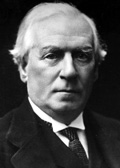 |
Herbert Henry Asquith
b. 12 Sep 1852, Morley, Yorkshire
d. 15 Feb 1928, The Wharf, Sutton Courtney, Berkshire |
| Title: |
Prime Minister and First Lord of the Treasury |
| Term: |
8 Apr 1908 - 5 Dec 1916 |
| Chronology: |
8 Apr 1908,
accepted the offer to hold the post of Prime Minister and First Lord of the Treasury, audience of the King, Hôtel du Palais, Biarritz, France [1][2] |
|
16 Apr 1908,
took the oath of office as First Lord of the Treasury before the King in Council, Buckingham Palace, London [3] |
|
5 Dec 1916,
tendered resignation as Prime Minister and First Lord of the Treasury (accepted), audience of the King, Buckingham Palace, London [4] |
| Names/titles: |
Viscount Asquith, of Morley in the West Riding of the County of York, and Earl of Oxford and Asquith (from 9 Feb 1925) [5] |
| Biography: |
| Originated from the family of a Yorkshire cloth manufacturer; received early education in Huddersfield College (1860-1861) and Moravian School, Fulneck (1861-1863); was sent to live with relatives in London and attended the City of London School (1864-1870); studied at Balliol College, Oxford (1870-1874); earned First Class Classics in Greats (1874); was called to the bar in 1876; elected to the Parliament as Liberal (1886-1918, East Fife; 1920-1924 Paisley); became a Queen's Counsel (1890); sworn in as a member of the UK Privy Council (18 Aug 1892); served as Secretary of State for the Home Department (18 Aug 1892 - 29 Jun 1895) under William Gladstone; declined nomination to the party leadership in favour of Sir Henry Campbell-Bannerman (1899), and when the latter became Prime Minister in 1905, Asquith was appointed Chancellor of the Exchequer (11 Dec 1905 - 16 Apr 1908); as a result of the sudden resignation of Campbell-Bannerman on health grounds, he accepted the post of Prime Minister and First Lord of the Treasury (8 Apr 1908 - 5 Dec 1916); after the death of Campbell-Bannerman, he was nominated Leader of the Liberal Party in the House of Commons (30 Apr 1908 - 14 Oct 1926); two General Elections in 1910 brought no overall majority in the House of Commons (Jan 1910: Liberal 275, Unionist/Conservative 273, Irish Parliamentary Party 71, Labour 40, Independent Nationalists 11; Dec 1910: Liberal 272, Unionist/Conservative 272, Irish Parliamentary Party 76, Labour 42, Independent Nationalists 8), but Liberal Party continued to govern with the support of Labour and Irish Parliamentary Party; contributed to building the foundation of the welfare state in the UK (National Insurance Act of 1911); oversaw the Parliament Act of 1911, modifying the powers of the House of Lords and ending their veto power over financial legislation; introduced the third Irish Home Rule Bill (1912), which was finally approved and given the Royal Assent on 18 Sep 1914, but was suspended until the end of World War I; served as Secretary of State for War (31 Mar 1914 - 6 Aug 1914); with the outbreak of World War I formed a Coalition Cabinet (27 May 1915 - 5 Dec 1916) to prosecute the war more effectively, in which David Lloyd-George was a very successful Minister of Munitions; in April 1916 the Dublin Easter Rising caused a serious political crisis, and the Battle of the Somme (Sep 1916) resulted in terrible British losses on the Western Front including the death of Asquith's son; by the end of 1916 Lloyd George proposed a small War Council to improve efficiency; an alliance of Lloyd-George and Bonar Law outmaneuvered Asquith when he insisted on chairing the Council; following a hostile press campaign, he resigned (5 Dec 1916); subsequently Asquith, as chairman of a part of the Liberal Party, played an important role in supporting Ramsay MacDonald and his first Labour Government in 1924. |
| Biographical sources: "Asquith: Portrait of a Man and an Era", by Roy Jenkins (New York: Chilmark Press, 1964); The Times, No. 44,818, Royal Edition, Thursday, February 16, 1928, p. 14 (obituary). |
| |
| [1] |
The Times, No. 38,616, London, Thursday, April 9, 1908, p. 8: "From the Court Circular. BIARRITZ, April 8. The Rt. Hon. H. H. Asquith, M.P., had an audience of The King to-day, and tendered his resignation as Chancellor of the Exchequer, which his Majesty was graciously pleased to accept. The King subsequently offered The Rt. Hon. H. H. Asquith the Post of Prime Minister and First Lord of the Treasury, vacated by the Rt. Hon. Sir Henry Campbell-Bannerman, M.P. The Rt. Hon. H. H. Asquith accepted His Majesty's offer and kissed hands upon his appointment." |
| [2] |
Appointment as Lord Commissioner of the Treasury (prior to appointment as First Lord of the Treasury) by Letters Patent under the Great Seal is announced by the Crown Office 22 Dec 1905, and gazetted 17 Apr 1908 (The London Gazette, No. 27866, Friday, December 22, 1905, p. 9171). |
| [3] |
The Times, No. 38,623, London, Friday, April 17, 1908, p. 12: "Court Circular. BUCKINGHAM PALACE, April 16. <...> The King held a Council this afternoon at 5 o'clock. <...> The Rt. Hon. H. H. Asquith, M.P. (Prime Minister), took the Oath of Office as First Lord of the Treasury."; The London Gazette, No. 28129, Friday, April 17, 1908, p. 2935. |
| [4] |
The Times, No. 41,343, London, Wednesday, December 6, 1916, p. 11: "Court Circular. BUCKINGHAM PALACE, Dec. 5. <...> The Right Hon. H. H. Asquith, M.P., had an audience of His Majesty this evening, and tendered his resignation as Prime Minister and First Lord of the Treasury, which The King was graciously pleased to accept." |
| [5] |
The London Gazette, No. 33019, Tuesday, 10 February, 1925, p. 983. |
|
Image: photograph, 1916. |

